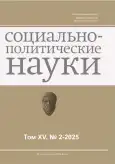Социокультурные и социокоммуникативные модели управления и регулирования политических рисков
- Авторы: Панеш К.М.1
-
Учреждения:
- Государственная Дума Федерального Собрания Российской Федерации
- Выпуск: Том 15, № 2 (2025)
- Страницы: 15-21
- Раздел: Политические институты, процессы и технологии
- URL: https://journal-vniispk.ru/2223-0092/article/view/296074
- DOI: https://doi.org/10.33693/2223-0092-2025-15-2-15-21
- EDN: https://elibrary.ru/NGQVHY
- ID: 296074
Цитировать
Аннотация
В исследовании рассматривается современные социально-политические процессы, происходящие в обществе. Автор определяет, что область социокультурных факторов политики выступает в качестве объекта управленческого воздействия. При этом немаловажное значение имеет то, что в роли субъектов регулирования социокультурных процессов выступают не только органы государственной власти, но и иные акторы, как присутствующие внутри социально-политической системы, так и имеющие к ней внешнее отношение. Все это в совокупности определяет динамический и разносторонний характер развертывающихся в обществе социокультурных процессов, в том числе определяет динамику формирования, актуализации, проявления, либо преодоления социально-политических рисков. Автор делает выводы, что практики управления социально-политическими рисками, направленные на область социокультурных установок членов общества, предполагают, с одной стороны, информационное и институциональное обеспечение процессов формирования конструктивных форм мировоззрения в гражданской среде, с другой – обеспечение социокультурных оснований устойчивости общества в отношении факторов информационного риска, а также активную деятельность, направленную на прямое противодействие негативным информационно-коммуникационным процессам.
Ключевые слова
Полный текст
Открыть статью на сайте журналаОб авторах
Каплан Мугдинович Панеш
Государственная Дума Федерального Собрания Российской Федерации
Автор, ответственный за переписку.
Email: panesh_kaplan@mail.ru
SPIN-код: 7735-6661
кандидат экономических наук; депутат
Россия, МоскваСписок литературы
- Арменский А.Е., Кочубей С.Э. Феномен войны с химерами (гибридные войны) // Россия: тенденции и перспективы развития. 2023. № 18-1. С. 497–504.
- Бартош А.А. Парадигма гибридной войны // Вопросы безопасности. 2017. № 3. С. 44–61.
- Биюмена А.А. Ценностные доминанты советского трудового дискурса // Труды БГТУ. Серия 4: Принт- и медиатехнологии. 2021. № 2 (249). С. 32–37.
- Булавина М.А., Новосельский С.О. Перспективы военной безопасности России в существующей геополитической конъюнктуре // Межгосударственное противоборство в условиях глобализации и его влияние на управление национальной обороной Российской Федерации: сборник. М., 2023. С. 105–112.
- Гофман А.Б. Солидарность или правила, Дюркгейм или Хайек? о двух формах социальной интеграции // Социологический ежегодник. 2013. С. 97–167.
- Ефременко Д.В. Политический риск в информационном обществе // Полит. наука. 2008. № 2. С. 48–63.
- Железняков С.С., Подосинников Е.Ю., Новосельский С.О. Реализация государственной информационной политики на муниципальном уровне // Инновационная экономика: перспективы развития и совершенствования. 2016. № 7 (17). С. 96–106.
- Коробов А.А., Овчинников С.А. Информационно-политические риски и устойчивость политической системы в условиях демократического транзита // Информационная безопасность регионов. 2012. № 1. С. 110–115.
- Маркузе Г. Одномерный человек. М.: Refl-book, 1994. 368 с.
- Мертон Р.К. Социальная структура и аномия // Социология преступности (Современные буржуазные теории). М.: Прогресс, 1966. С. 299–313.
- Мертон Р.К. Социальная теория и социальная структура / пер. с англ. Е.Н. Егоровой и др.; науч. ред. З.В. Коганова. М.: АСТ, Хранитель, 2006. 873 с.
- Миночкин А.Л. Информационно-политические риски постиндустриализма: конструктивный анализ // Вестник ПАГС. 2013. № 3 (36). С. 100–106.
- Нарыков Н.В. К вопросу об определении факторов интенсификации современных политических процессов // ИСОМ. 2014. № 6-1. С. 295–298.
- Новосельский С.О., Моисеева О.А., Филиппова О.А. Коммуникационная политика органов исполнительной власти с населением в социальных сетях // Вопросы политологии. 2023. Т. 13. № 3 (91). С. 1001–1013.
- Осипов Н.Е., Трифонов Г.Ф. Основной вопрос социальной философии в зеркале реформ современной России // Известия Саратовского университета. Серия: Философия. Психология. Педагогика. 2014. № 2-1. С. 35–38.
- Парсонс Т. Система современных обществ / пер. с англ. Л.А. Седова, А.Д. Ковалева. М.: Аспект-Пресс, 1997. 270 с.
- Чупров В.И., Зубок Ю.А., Романович Н.А. Отношение к социальной реальности в российском обществе: социокультурный механизм формирования и воспроизводства: монография. М.: Норма: ИНФРА-М, 2022. 352 с.
- Шютц А. Смысловая структура повседневного мира: очерки по феноменологической социологии / сост. А.Я. Алхасов; пер. с англ. А.Я. Алхасова, Н.Я. Мазлумяновой; науч. ред. пер. Г.С. Батыгин. М.: Институт фонда «Общественное мнение», 2003. 336 с.
Дополнительные файлы








